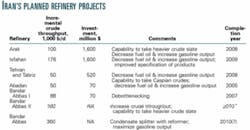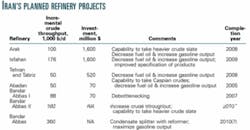FACTS: Iran's refinery megaproject may face more delays
Iran's plans to implement a major refining project in a bid to cope with surprisingly strong gasoline demand growth may face further delays.
That's the view of Honolulu consultancy FACTS Inc., headed by Fereidun Fesharaki.
Iran's gasoline demand has surged to unexpected levels. Imports jumped to 160,000 b/d this year from 100,000 b/d in 2003, "resulting in an import bill of $2-3 billion in 2004," FACTS reported.
State oil company National Iranian Oil Co. (NIOC) plans to increase the crude capacity of its Bandar Abbas refinery in two phases to more than 640,000 b/d from 232,000 b/d currently. Three condensate splitters are to be added later to produce 180,000 b/d of gasoline "to eliminate Iran's imports by 2007," FACTS said. "This would then create a 1 million b/d complex, with strong synergy between the refinery and condensate splitters."
Iranian officials decided to award the construction contract for the splitters to China Petrochemical Corp.'s operating unit Sinopec, which would provide the technology, and NIOC Pension Fund, which would provide the necessary capital.
"Sinopec has little experience with condensate splitters and high-mercaptan liquids. NIOC Pension Fund has little experience with such kinds of projects," FACTS noted. "In our view, such a combination is a recipe for delay. It will be very difficult to meet the 2007 target date. The project implementation is estimated at 32 months, but with the right model."
FACTS claims the best-qualified company for the project is NIOC's own refining subsidiary, National Iranian Oil Refining & Distribution Co. As the project now stands, the consultant said, "The condensate splitters are now in doubt, and the imports are expected to continue their relentless growth. By 2010, gasoline imports could reach 250,000 b/d without the condensate-splitting projects."
Phase 2 of the Bandar Abbas expansion is aimed at taking all production of 18º gravity crude from Soroush field off Iran, "as marketing [that] crude is proving problematic," said FACTS analysts. Phase 3 is not yet finalized, they said.

